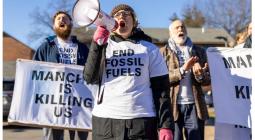‘Climate Pragmatists’ Tout Fossil Investment as Big Companies Fall Short on Pledges

Some of the world’s biggest financial operators appear to be adopting a new “climate pragmatism” that favours short-term investments in fossil fuels, even as new research shows the world’s biggest businesses falling behind in setting and meeting meaningful net-zero targets.
In their latest annual letters to shareholders, JPMorgan Chase CEO Jamie Dimon and BlackRock CEO Larry Fink call respectively for a “realpolitik” approach to climate goals and a new form of “energy pragmatism”, Time magazine reports, as they to navigate U.S. culture wars that have alt-right critics accusing them of “green wokeism”.
Dimon’s letter calls it “enormously naïve” to try to shut down oil and gas extraction, contending that “one of the best ways to reduce CO2 for the next few decades is to use gas to replace coal” and citing liquefied natural gas exports as a “great economic boon” to the United States.
“Trade is realpolitik, and the recent cancellation of future liquified natural gas (LNG) projects is a good example of this fact,” Dymon told shareholders. “The projects were delayed mainly for political reasons—to pacify those who believe that gas is bad and that oil and gas projects should simply be stopped.”
Fink, who in past years has drawn attention for his more climate-forward commentary, devoted a section of his shareholder letter to what he called “energy pragmatism”, a call for infrastructure investment to reflect the “mega force” of the energy transition while accepting that most parts of the world will “rely on hydrocarbons for a number of years” to assure their energy security.
“I’m hearing more leaders talk about decarbonization and energy security together under the joint banner of what you might call ‘energy pragmatism’,” he wrote, citing conversations with political and business leaders in 17 countries.
“These leaders believe that the world still needs both. They were far more pragmatic about energy than dogmatic. Even the most climate conscious among them saw that their long-term path to decarbonization will include hydrocarbons, albeit less of them, for some time to come.”
“What do ‘realpolitik’ and ‘energy pragmatism’ mean in more concrete terms?” asks Time senior correspondent Justin Worland. “It’s almost self-evident that embracing fossil fuels isn’t good for efforts to meet climate targets. Burning these energy sources is what causes climate change, after all,” and “building new gas infrastructure risks locking the fossil fuel into the energy mix for decades to come.”
But “the acceptance of gas doesn’t mean a wholesale abandonment of climate finance,” Worland adds. “Indeed, both letters include an embrace of opportunities to finance the energy transition,” with Fink citing nearly $140 billion in energy transition-aligned finance, compared to $300 billion in fossil fuels and other traditional energy forms. “Dimon, for his part, cites client interest in continuing to finance clean energy infrastructure and the growth opportunities unlocked if the world spends the trillions necessary to meet climate targets.”
But those distinctions don’t add up for science commentator Anjana Ahuja, who scorches the new “pragmatists” in a post-Earth Day opinion piece for the Financial Times. With multiple new analyses showing a cascade of heatwaves, wildfires, storms, floods, and resulting multi-trillion-dollar losses, and with alpine glaciers losing one-tenth of their mass in the last two years, pragmatism “is too kind a label,” she writes. “Those watering down efforts to limit global temperature rises should instead be regarded as ‘hot earthers’—defenders of an outdated status quo and comparable, in their rejection of reality, to the flat-earthers who resist the concept of curvature.”
Elsewhere, a new analysis concludes that while the world’s biggest publicly-traded companies aren’t doing a great job of pursuing robust emission reduction targets, a far smaller proportion of large, privately-held businesses have set net-zero or emission reduction targets or explained how they’ll deliver on their promises.
“The good news is that, weighted by annual revenue, net zero targets now cover nearly 80% of the world’s largest 2,000 publicly listed companies, up from less than 20% in 2020,” even if “the integrity and clarity of these targets are weak,” reports [pdf] Net Zero Tracker, a project of the UK’s Energy & Climate Intelligence Unit, the Data Driven Envirolab, the NewClimate Institute, and Oxford Net Zero.
“The not-so-good news is that the picture at the privately-owned company level looks much worse,” with only 40 of the world’s 100 biggest enterprises reporting climate targets as of this month, an increase of only eight since October, 2022, compared to 70 of the publicly-held corporations.
“As the corporate world of net zero moves from being defined by bottom-up voluntary efforts to top-down mandatory rules, private companies not only continue to trail behind their publicly-owned counterparts by around half on net zero intent, they trail behind on the integrity of their strategies to get there,” the report states.
“Dozens of private companies in the largest markets in the world—the EU, the U.S. and China—still do not have net zero or emission reduction targets,” it adds. “As the regulatory landscape develops around them, staying silent on net zero increases transition risks for themselves, and undermines collective emission-cutting efforts by governments and other non-state entities.”
That finding underscores “the mounting transition risks faced by those neglecting to address their emissions and/or ignoring the regulatory landscape that is increasingly seeking to mandate climate action.”
Net Zero Tracker reports that:
• 82 of the public companies, but only 52 of the private ones, had net-zero or emission reduction targets.
• Nine of the 10 biggest public companies, but only four of the biggest private ones, had expressed even a rhetorical commitment to net-zero.
• Of the companies with published commitments, 80% of the public companies but only 20% of the private firms had published plans to deliver on their pledges.
• Only two of those eight, multinational furniture giant IKEA and engineering consultancy Bechtel, have ruled out deeply controversial carbon credits as a path to their net-zero goals. Some 63% of the private companies and 57% of the publicly-listed ones have published interim targets en route to net zero.





